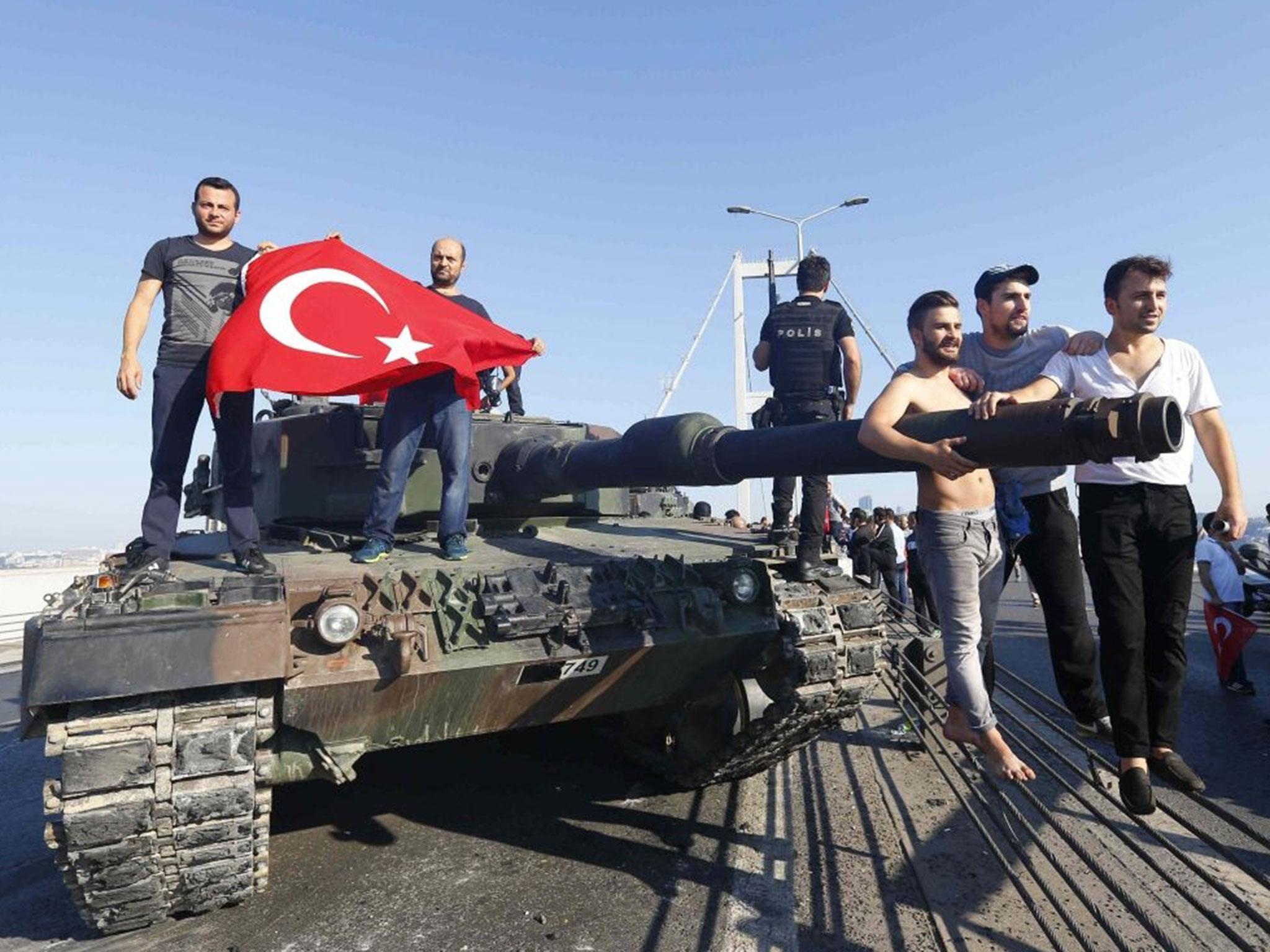Turkey coup: Erdogan set to crush all opponents and purge army after surprise failed attempt
Coup never likely to succeed once it had lost advantage of surprise

Your support helps us to tell the story
From reproductive rights to climate change to Big Tech, The Independent is on the ground when the story is developing. Whether it's investigating the financials of Elon Musk's pro-Trump PAC or producing our latest documentary, 'The A Word', which shines a light on the American women fighting for reproductive rights, we know how important it is to parse out the facts from the messaging.
At such a critical moment in US history, we need reporters on the ground. Your donation allows us to keep sending journalists to speak to both sides of the story.
The Independent is trusted by Americans across the entire political spectrum. And unlike many other quality news outlets, we choose not to lock Americans out of our reporting and analysis with paywalls. We believe quality journalism should be available to everyone, paid for by those who can afford it.
Your support makes all the difference.A striking feature of the failed military coup in Turkey is that President Erdogan and his government did not know that there was an extensive conspiracy within the armed forces aiming to seize power.
It was widely assumed that the era of military coups in Turkey was over and the army has recently had good relations with Mr Erdogan.
It may only have been a faction within the military, but it was able to strike in multiple places in Istanbul, Ankara and elsewhere, even detaining the Turkish chief-of-staff Gen Hulusi Akar for several hours until he was freed by anti-coup troops.
His headquarters in Ankara were still being reportedly held by pro-coup forces on Saturday morning.
At the height of the coup, tanks closed the bridges over the Bosphorus and members of parliament in Ankara were hiding in the cellars of their assembly building in Ankara as it came under fire.
Pro-coup helicopters were strafing the intelligence headquarters and one was shot down by an F-16. The government was eager to declare that the coup had been smashed, but there are still signs of official nervousness with Turkish airspace around Istanbul being closed, opened and then closed again.
The coup was never likely to succeed once it had lost the advantage of surprise, which it did fairly rapidly as news spread of what had happened.
The plotters failed to eliminate, detain or isolate President Erdogan who was on holiday in Marmaris from which he was able to use a reporter’s phone to communicate with a television studio and call for people to take to the streets in opposition to the coup.
He followed this up by flying to Ataturk Istanbul airport, where he was well placed to show that he was still in command.
The plotters made a strong effort to gain control of the media, trying to storm the national satellite communications centre at Golbasi near Ankara. This led to fighting in which 42 people were killed before the pro-coup forces were repulsed. They temporarily entered the offices of TRT state television and compelled an announcer to read out a text notable for its vagueness describing themselves as the Peace at Home Movement. It accused the government of eroding the democratic and secular rule of law and said country would be run by a "peace council" that would ensure the safety of the population.
The pro-coup forces later withdrew, but it would have been difficult in any case for them to have closed down or taken control of the many TV channels and other media outlets unless they had the full support of all the Turkish military.
The political affiliation of the leaders of the coup is still unclear though President Erdogan was quick to blame it on the movement of Fethullah Gulen, which his government commonly calls “the parallel state structure”.
This may well be so, though in the past the army has been seen as the stronghold of secularism. So far 1,563 soldiers have been arrested including five generals and 29 colonels, the detentions being carried out by the police who, unlike the gendarmerie, remained loyal to the state.
The air force also opposed the coup from an early stage, shooting down two helicopters. The Turkish Prime Minister Binali Yildirim gave a suspiciously precise figure of 2,839 for the number of officers and rank-and-file taking part in the attempted coup, but this sounds too few given the number of incidents.
Even military coups require strong support from some sections of society if they are to succeed and all the evidence is that the plotters did not have an active political constituency.
This is despite the fact that Turkey is deeply divided between supporters and opponents of President Erdogan and his AKP party and between Turks and Kurds.
But it was never likely that even those who have been targeted by Mr Erdogan would rally to a military conspiracy given their hostility to the dominant influence the Turkish military wielded from the foundation of the republic until a few years ago.
The government is presenting what has happened as a triumph of popular opposition, Mr Yildirim praising with some justice “the 15 July Festival of Democracy”.
No doubt Mr Erdogan will now purge the army of any potential opponents and to solidify his grip on all the security forces. Yesterday he claimed the coup plotters had tried to kill him and said that "they will pay a heavy price for this. This uprising is a gift from God to us because this will be a reason to cleanse our army."
He will presumably use the failed coup as an excuse to eliminate all other sources of dissent and opposition.
Join our commenting forum
Join thought-provoking conversations, follow other Independent readers and see their replies
Comments